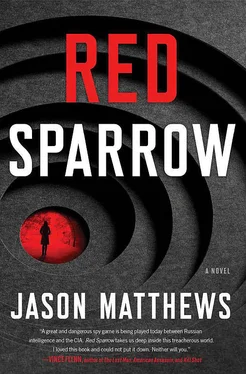Marta regained consciousness quickly, like a surfacing rush, coming back up to the light. She was naked on her back, on her narrow, bitter little bed. She felt the pull of tape over her mouth. Her hands were tied behind her, the knots on her wrists dug into her back. The familiar bedside lamp with its faded, gauzy pink shade cast a mild light on the bedspread. Her legs were tied together at the ankles. She pulled and tested each knot, but there was no give.
She heard a noise, turned her head, and her heart stopped. It was the most terrifying thing she had ever seen. The man was wearing her India shirt. He was dancing around the little room, rocking his body forward and back. The knife was in his hand, and he occasionally twirled it above his head as he pirouetted. Marta began weeping silently.
Sergey Matorin was forty-five hundred kilometers away on a head trip to the Panjshir Valley. He contemplated the shadows cast by the little pink lamp in Marta’s bedroom. He was in his Alpha Group’s sandbag bunker built into the hill with the hissing gas lantern casting green light into the corners of the shelter. Marta’s trussed-up body became the body of the wife of the village headman, taken hostage during a dawn raid as punishment for sheltering insurgents. The Helsinki rain pattering against the window was the howling Hundred Nights Wind that carried the sands of the northern desert up and over the Kush in billowing clouds and shook the bunker’s corrugated tin door. “Khyber” was home again.
The Afghan woman had died sometime in the early evening, too much excitement, or too much handling by a succession of his troopers, or perhaps the ammo belt around her neck, stapled to the plywood wall, had gotten too tight across her throat. She was upright against the wall, chin up as if in pride, held by the collar, her dead eyes flashing green from the lantern. She kept Khyber company. He was sitting, swaying to tinny Afghan music from a tape deck, but the batteries were fading and the music kept slowing down and speeding up.
Marta thrashed from side to side hoping to loosen one arm, get her legs free, to be able to fight him. Her movement attracted his attention and he climbed on the foot of the bed and on hands and knees started inching toward her. The shirt billowed around his body. He hovered over her, looking down, pressing his weight on her. She kept straining her arms, the cords in her neck standing out. Matorin lowered his face inches from hers and looked into her eyes, listened to her huffing breaths. He ripped the tape from her mouth and savored her labored, panicked breathing. “ Bozhe, ” she whispered.
His eyes searched her face as his unseen hand shivered the tip of the Khyber knife at a shallow angle up under her diaphragm nearly nine inches, completely through her heart, and up into her throat. Marta arched her back, convulsing. Her open mouth could make no sound and her body bucked against the ropes. Matorin rode the tremors in her body, felt her hoarse breaths quicken, and watched, watched, watched the light go out in eyes that partially rolled back inside her head. A trickle of blood oozed from one nostril and out of the corner of her mouth. It took Marta three minutes to die. She didn’t hear Matorin whisper, “ Bozhe? No, God could not be here tonight.”
=====
Dominika entered the rezidentura the next morning and looked over at Marta’s empty desk. Probably a long night of aquavit, she thought.
When Marta had not come in by midmorning, Volontov stuck his head out of his office and yelled, “Where is Yelenova this morning? Has she called in sick?” No one knew where she was. “Corporal Egorova, call her at her flat. See if you can reach her.” Dominika dialed several times but no one answered. Volontov called the security officer and told him to go over to her apartment, pound on the door, use the office copy of her key to get in. He returned an hour later to say that the apartment was empty but looked perfectly normal. Clothes in the closet, dishes in the sink, bed made.
“Draft a short cable to the Center,” barked Volontov to the security man, who looked at Volontov like a Rottweiler waiting for hand signals. “Inform them that Administrative Assistant Yelenova, Marta, has not reported for work, whereabouts unknown. She has not called in sick. Inform them we are searching for her and also filing a request to the Finnish National Police to search for her. Call your contact in the police. Tell them the embassy demands immediate action and utmost discretion. Go.”
Volontov called his counterintelligence referent into the office and shut the door. “We may have a problem,” he said. “Marta Yelenova has not reported to work.” He checked the SVR-issue wall clock above the door. “It’s been almost five hours,” he said.
His Line KR man, an unimaginative beast of burden formerly from the KGB Border Guards Directorate, looked at his watch, as if to confirm Volontov’s estimate of the time. “Get over to Supo,” Volontov said. “Ask for an appointment with Sundqvist. Tell them about Yelenova, that we think she’s been kidnapped. Ask them to check all the terminals: air, rail, ship.”
“Kidnapped?” asked the CI man. “Who would kidnap Yelenova?”
“Idiot. We’re not going to tell Finnish intelligence we think she defected. Just get them to start checking. They’ll have visa photos of her. Tell them utter discretion is imperative. And keep your mouth shut.”
In the next six hours the police had made no progress, but Supo had retrieved a photo of a woman vaguely resembling Yelenova at the Haaparanta border-crossing station at the Swedish border on the Gulf of Bothnia. The woman was wearing a scarf and dark glasses that concealed most of her face, but the nose and chin were right. Supo said the woman was processed through immigration control with a Finnish passport in the name of Rita Viren, a name the Finns were tracing. She was in the company of an unidentified man with sunglasses and a baseball cap.
“That confirms it,” said the CI man. “It was the Americans. She defected to the CIA.”
“Imbecile. How did you arrive at that?” said Volontov.
“Look at the ball cap, Colonel,” said the CI man, pointing at the Supo security-video photos that had been faxed to the Russians. “It says New York on the cap.” Volontov told him to get out.
The office was afloat in rumors. A murder? A kidnapping? The word no one dared utter. Defection? Everyone knew Marta and Volontov had had a screaming match several weeks ago. But to run away? Dominika was beside herself. Marta would not defect, but if she did, she would not leave without saying good-bye. She had only joked about both of them defecting together. No. Something bad had happened. Then she froze. Did They somehow know she, Dominika, was not reporting, falsifying progress with Nash? Was Marta’s disappearance a warning? Ridiculous. There was some very easy explanation. Marta had run off for a week to Lapland with a blond yoga instructor. Anything. But Dominika couldn’t convince herself.
The search for Yelenova continued for days, without result. Volontov was frantic that the disappearance of one of his people would stain his copybook at the Center, an ironic fixation considering his pokey thirty-year career ledger was already liberally blotted with sloth, inattention, and careerism. The embassy protested to the Finnish Ministry of Foreign Affairs and to the Interior Ministry about the criminal kidnapping of one of its diplomatic personnel, whose security, they reminded the uncomfortable Finns, was the direct responsibility of the Finnish government. A special Moscow investigator arrived from Directorate K to interview embassy officers and the rezident, as well as to confer with Finnish investigators. He left after four days, solemnly concluding that Ms. Yelenova had disappeared.
Читать дальше












